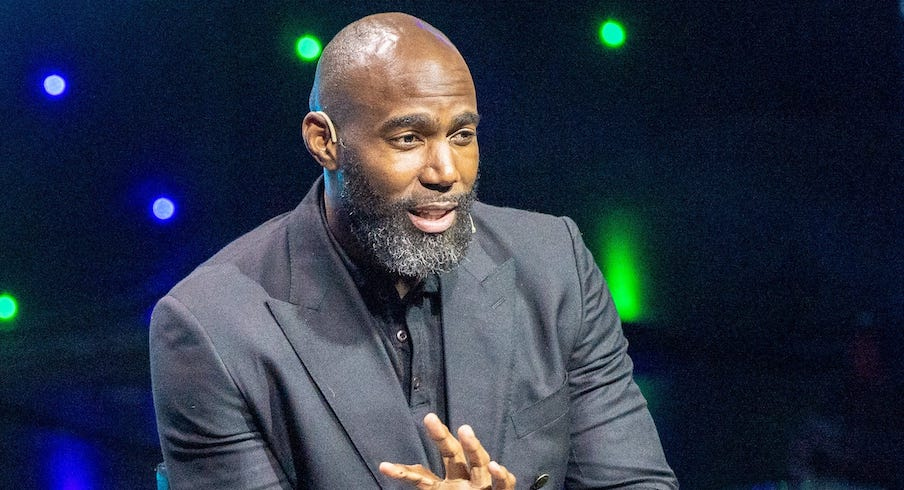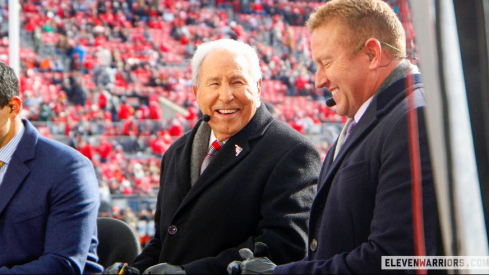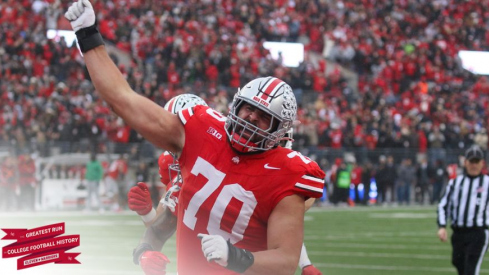While spending time at home during the COVID-19 pandemic in 2020, Malcolm Jenkins reflected on his career and decided he should write a book to share his life story.
Three years later, that book is now complete. “What Winners Won’t Tell You: Lessons from A Legendary Defender,” a memoir written by the former Ohio State defensive back, will be released on Tuesday.
In the book, Jenkins shares stories from his lengthy football career – which included 13 seasons in the NFL after his All-American career at Ohio State – and his life away from the football field. He wrote the book with an eye toward educating others and sharing his perspective through various life experiences.
“I really wanted to contextualize the things that I've been through to, to leave kind of a blueprint for those who have come behind me, for those who are looking for insights to how to be successful, how to be a leader, what goes into fatherhood and family, all of those things are in this book. How I was able to take my platform and have as much impact as possible,” Jenkins told Eleven Warriors. “Those are things that I wanted to make sure didn't just leave because I was changing positions, changing careers.
“And so I put it into this book, and that was something that was definitely therapeutic. There are parts that are very, very vulnerable, that I haven't talked about. There are obviously a lot of things that everyone, being in the limelight, everyone's watched some of these games and seen some of these moments, but I allow people to see my inner thoughts and bring them into my view, which is a different perspective to maybe look at those moments a little differently. But I thought it was important. I think all of us have stories, and I think one of the most impactful things that we can do is share.”
Jenkins said he’s looking forward to hearing what fellow athletes take away from the book, but he believes his story can resonate with anyone who wants to impact the world regardless of their profession.
“I think there a ton of things that people can learn. It just depends on where you are in life,” Jenkins said. “I'm excited personally to see what athletes and those around athletes, how they digest this book. Everything from not only the demands of the on-field or on-court performance, but the demands of being a high performer, what that does to the family around you, the business of sports, all these things I've had to navigate … I want people to get a better insight of that, but also, people who are looking for examples of people who know how to persevere and were always curious.
“I'm somebody who's always been a forever learner. And I stopped focusing on wins and losses and really dedicated myself to the details of the process and learning that the enjoyment of life is in the process. It's not in the game. We don't get to control the results of our competition, but what we do control is how we play the game. And that's really what I want people to leave with.”
As a football player, Jenkins built a memorable legacy in Columbus, New Orleans and Philadelphia. One of only two Ohio State defensive backs (along with Antoine Winfield) to win the Jim Thorpe Award, Jenkins is one of the greatest cornerbacks in Ohio State history, and he’ll be recognized accordingly this Friday when he is inducted into the Ohio State Athletics Hall of Fame. He won two Super Bowls and made three Pro Bowls throughout his 13 NFL seasons with the Saints and Eagles, giving him a place among the greats in both franchises’ history.
But Jenkins doesn’t want his lasting legacy to be solely based on what he accomplished on the football field. Jenkins is an investor in various businesses, has long worked to help underserved youth through The Malcolm Jenkins Foundation and has been a vocal advocate for social justice and racial equality. He says he strives to make an impact in everything he does, and he hopes his book will help him do that.
“If all you remember is what I did on the field, then I’ve failed. I’ve put a lot of effort into a ton of other things,” Jenkins said. “But I want impact, essentially. Everything I do, I want to have impact. The way I played the game, I wanted to impact the fans watching, I wanted to impact my teammates that I played with. When I do things in the community, I want to impact youth, I want to impact and strengthen communities, I want to do business to have impact. I don't care to just make all the money I can in the world. I want to set up my community, my family, my friends, and be an example.
“So those things for me really transcend sports. It gives me a purpose of waking up every day. I can shed myself of all those accolades and still look forward to something else. And that took a long time. But it's definitely, now being on this end, I see how it's helped me in this moment of transition, where my peers are struggling, a lot of us are struggling, dealing with leaving the game and leaving what we thought was so important, leaving what the world cheered us on for, and then to be left with yourself and not like what you see. And I think that's a lot of people. A lot of people can relate to that story. So hopefully my journey bears some witness to how to maneuver around that.”
Since he retired from football in 2022, Jenkins says his biggest priority has been spending more time with his children. But he says he’s also enjoyed being able to invest more time and effort into his off-field endeavors.
“I've sacrificed so much time, and a lot of us do to work, to go pursue our dreams, and that takes away from your time as a father and things like that. So having joint custody for my kids, when I'm with them, that is all I'm doing,” Jenkins said. “And then I'm spending the other half of my time learning. And then I use what I learn, I'm always curious, so whether it's reading books, it’s traveling, it’s learning from other people in fields that I'm trying to get into, always learning and applying it to myself.
“I have a portfolio of businesses, I’ve got a decade's worth of community work and social work. But now, it's like, how do I take all the things I've learned over these last 13 years and apply them in every facet of life? How do I take that same mentality and approach my businesses the same way I approached the game? That part is new. And it's fun. It's exciting. It's where I get to feel like a rookie again. And that gives me a little a little bit of energy.”
“If all you remember is what I did on the field, then I’ve failed. I’ve put a lot of effort into a ton of other things.”– Malcolm Jenkins
As for his time at Ohio State, Jenkins still has many fond memories from his four years as a Buckeye. When Jenkins arrived in Columbus from New Jersey, he initially felt out of place. By his junior year at Ohio State, he loved life at OSU so much that he chose to stay for his senior season even though he was already a top NFL draft prospect. He said the key to maximizing his time as a Buckeye was getting involved in more than just football, as he became a member of the Omega Psi Phi fraternity and participated in other off-field activities around campus.
“Being a kid from New Jersey who grew up in a really diverse background, to get plucked out of there and then go to Columbus, Ohio, to Ohio State, which is very white for me, it was like the worlds were so different that I really was lost for a little while because I didn't have a sense of community. I had the football team, but when I wanted to do things outside of football, I didn't have it,” Jenkins said. “And then I found it through my fraternity. I found it through getting involved on campus and all the great things that are happening in that school and in that community. That gave me a sense of purpose. That gave me a sense of home away from home. That has allowed me to move to different places and understand how to maneuver, how to have impact, how to create community, how to get out into the world but also have a safe haven.”
Jenkins also credits his head coach at Ohio State, Jim Tressel, with playing an integral role in helping him become the man he is today.
“I tell people all the time, I don't think he's ever coached me a single thing about football. It's all been about how to be the best man, the best citizen you can be,” Jenkins said.
Based on his own experiences as a Buckeye and beyond, Jenkins says the biggest piece of advice he would give Ohio State’s current players is “life is bigger than ball.”
“One of the things that is becoming very clear now that I'm out of sports, you have to really sit with yourself and figure out ‘Who am I?’ And you realize that all of these things that you've done in sports has prepared you to be excellent in the world,” Jenkins said. “You've been in a highly competitive environment, you've learned everything about leadership, you've learned conflict resolution, you know how to be disciplined, you understand how to take instruction, you understand how to lead. You know all of these things, you're gonna be very, very valuable in the world somewhere else. The only way you won't be is if you continue to see yourself as just a football player. If you don't see how those things add value to any organization out there.
“And so, to me, that's really the biggest thing is for them to understand, especially in college athletics, right now, you are a business. You have the ability to empower others around you just by what you do for a living, with the stages and platforms you’re on. So soak up as much information as possible. Bring your family and those who are closest to you into that process so that they learn. It's like an investment; the earlier you invest, the more return you see on the back end. And so there are athletes right now that I'm saying ‘Invest in yourself now.’ Because when you're done – and this game will be done with you, you will be done playing sports at some point in time, whether they kick you out or you leave on your own accord – it will be over, and when you're over with (playing), that's really where your life is going to begin. So start that investment now.”
Now nearly 15 years removed from his own collegiate career, Jenkins says he doesn’t know any current Ohio State players. However, he looks forward to meeting some of them this week when he’s back on campus for his Hall of Fame induction on Friday at the Covelli Center. He says he still watches the Buckeyes as a fan and hopes his story can inspire others just like the Ohio State greats before Jenkins were for him.
“It's a huge honor, and it's really humbling, because I wasn't really aiming for those things,” Jenkins said of becoming an Ohio State Athletics Hall of Famer. “You hope that the work that you put in and the things that you create in his world have longevity and are appreciated long after you've done them. And so to have gone on this journey, left Ohio State and to be recognized in the Hall of Fame, it just puts the bow on all those things that I did so long ago. And hopefully, those who are following behind me just see that as an example.
“I remember Mike Doss pointing out to me, kind of the Ohio State greats, and he pointed to Antoine Winfield, who was the only person that had ever won the Jim Thorpe Award at the time in Ohio State history. And how motivating that was for me, just seeing that example of like, ‘Oh, that's what it takes to be the best in the country.’ Okay. Now, I'm doing everything that that dude did to try to get there. And so hopefully my example is one that not only athletes but people in general follow.”
“What Winners Won’t Tell You” is available for preorders through the book’s official website and various retailers, including Amazon, Barnes & Noble, Books-A-Million and Bookshop.


